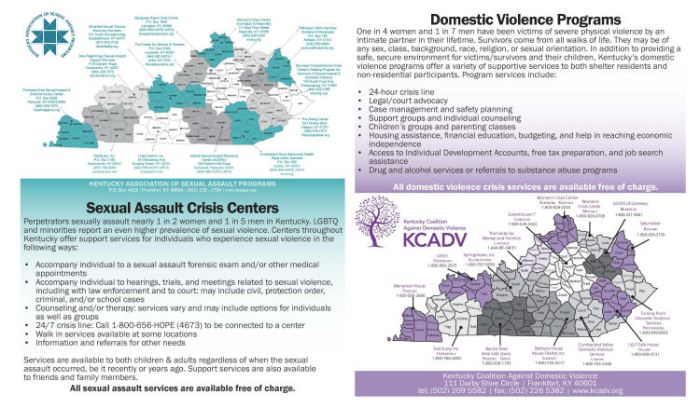Krs 209a no longer requires mandatory reporting – KRS 209A, a significant piece of legislation in the context of mandatory reporting of child abuse and neglect, has undergone a notable change. The previous requirement for mandatory reporting under KRS 209A has been eliminated, raising questions and concerns among professionals and the public alike.
This article delves into the implications of these changes, exploring the rationale behind the amendments, the impact on professionals and child welfare, and providing guidance on best practices in the absence of a mandatory reporting requirement.
Introduction

Kentucky Revised Statutes (KRS) 209A played a pivotal role in mandating the reporting of suspected child abuse or neglect. However, recent amendments have significantly altered these requirements, eliminating the mandatory reporting obligation for certain professionals.
Previously, KRS 209A imposed a legal duty on a wide range of professionals, including teachers, social workers, and medical personnel, to report any suspected cases of child maltreatment to the relevant authorities. This obligation was intended to ensure the timely identification and intervention in cases of child abuse or neglect.
Changes to KRS 209A

The recent amendments to KRS 209A have removed the mandatory reporting requirement for certain professionals. Specifically, the changes exempt professionals who are not mandated reporters under federal law, such as attorneys, clergy members, and mental health professionals.
The rationale behind these changes stems from concerns about the potential chilling effect of mandatory reporting on individuals seeking help from these professionals. By eliminating the mandatory reporting obligation, it is hoped that individuals will feel more comfortable disclosing sensitive information, leading to earlier identification and intervention in cases of child abuse or neglect.
Implications for Professionals
The changes to KRS 209A have significant implications for professionals who were previously required to report suspected child abuse or neglect. While the mandatory reporting obligation has been removed, these professionals still have an ethical and moral responsibility to protect children from harm.
In the absence of a mandatory reporting requirement, professionals must carefully consider the best course of action when encountering suspected cases of child abuse or neglect. They should weigh the potential risks and benefits of reporting, taking into account the child’s safety, the potential impact on the family, and their own professional obligations.
Impact on Child Welfare
Concerns have been raised about the potential impact of the changes to KRS 209A on the identification and reporting of child abuse and neglect cases. Some experts argue that the removal of the mandatory reporting requirement may lead to decreased reporting, resulting in fewer cases being brought to the attention of child protective services.
However, it is important to note that there are alternative reporting mechanisms available for individuals who suspect child abuse or neglect. These mechanisms include reporting directly to child protective services or law enforcement, or contacting a child abuse hotline.
Alternative Reporting Mechanisms
In the absence of a mandatory reporting requirement, it is crucial that alternative reporting mechanisms are accessible and effective. These mechanisms should provide individuals with a safe and confidential way to report suspected cases of child abuse or neglect.
Some examples of alternative reporting mechanisms include:
- Reporting directly to child protective services or law enforcement
- Contacting a child abuse hotline
- Reporting to a trusted adult, such as a family member, friend, or teacher
Best Practices for Professionals
In the absence of a mandatory reporting requirement, it is essential for professionals to adopt best practices for responding to suspected cases of child abuse or neglect. These best practices include:
- Maintaining a high level of awareness of the signs and symptoms of child abuse and neglect
- Documenting any observations or concerns regarding a child’s well-being
- Consulting with colleagues or supervisors when in doubt about whether to report a suspected case
- Following up on any reports made to ensure the child’s safety
Education and Awareness, Krs 209a no longer requires mandatory reporting
Ongoing education and awareness campaigns are essential to ensure that the public and professionals are informed about the changes to KRS 209A and the importance of reporting child abuse and neglect.
Educational efforts should focus on:
- Raising awareness of the signs and symptoms of child abuse and neglect
- Informing the public about the alternative reporting mechanisms available
- Emphasizing the ethical and moral responsibility to report suspected cases of child abuse or neglect
FAQ Corner: Krs 209a No Longer Requires Mandatory Reporting
What are the key changes to KRS 209A?
KRS 209A no longer requires mandatory reporting of suspected child abuse or neglect by professionals.
What are the implications for professionals who were previously required to report under KRS 209A?
Professionals must still report suspected child abuse or neglect if they have a reasonable belief that a child is being abused or neglected. However, they are no longer required to report if they only have a suspicion.
What are the potential consequences for professionals who fail to report suspected child abuse or neglect?
Professionals who fail to report suspected child abuse or neglect may face ethical and legal consequences, including disciplinary action or criminal charges.
What are some alternative reporting mechanisms for individuals who suspect child abuse or neglect?
Individuals who suspect child abuse or neglect can report it to the Kentucky Child Abuse Hotline (1-800-752-5244) or to local law enforcement.

